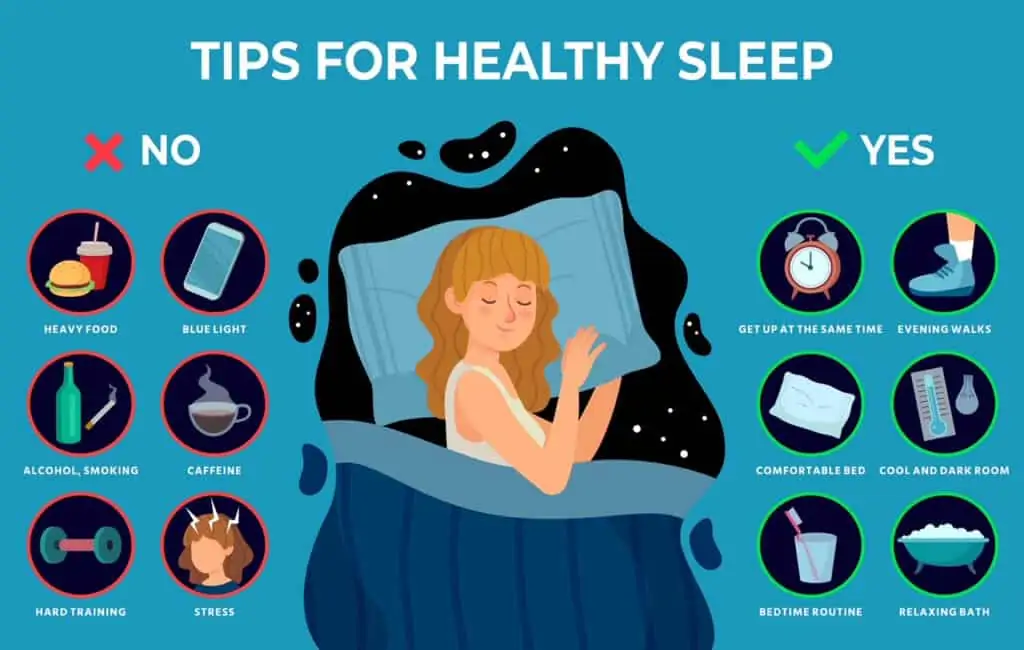Top 14 Sleep Tips: How to get a better night’s sleep (Part 1)

I often chuckle at how little kids fight taking a nap or going to bed, while adults wish for the opportunity to sleep during the day or tuck in early or sleep in late. Kids need even more sleep than adults, and they look so darn cute while doing it, so why the struggle? If only they knew all the benefits of sleep…
Every day, your body needs time to readjust its settings, clear out waste materials, and build new tissues. You know your body needs proper sleep to do this. But do you know why you wake up at 3:00 a.m. and can’t get back to sleep? Or why feeling fatigued and moody is messing with your hormones?
Would you like to understand how sleep really works, as well as how to improve your ‘sleep hygiene’, and get better sleep? You’re in the right place. Keep reading…
First, Why is Getting Good Sleep So Hard?
We are a sleep-deprived society. We work too much, stress too much, and are overstimulated by light, technology, caffeine, and alcohol.
Sleep should be a priority, but other things often seem more important. So that even when we do allow ourselves enough time to sleep, our minds are so active that we don’t sleep well. We either have trouble going to sleep, or we wake up in the middle of the night. and can’t go back to sleep.
And, to complicate sleep further, as we age, we have more trouble falling into a deep sleep, and we also get less hours of sleep—even though we still need the same amount of sleep as we did when we were younger.
Here’s what you need to know about getting a better night of sleep:
Stages of Sleep
Sleep involves both non-REM (rapid eye movement) sleep and REM sleep. We cycle between these two all night long. There are three stages for non-REM sleep, each lasting 5–15 minutes:
Stage 1: Eyes are closed but it’s easy to wake up.
Stage 2: Light sleep—heart rate slows, and body temperature drops to get the body ready for a deeper sleep.
Stage 3: Deep sleep—hard to rouse, and we feel disoriented if awakened. This is the time the body repairs itself—the immune system is strengthened, bone and muscle tissues are replaced, etc.
REM sleep occurs 90 minutes after you fall asleep—the first time is for about 10 minutes, and then each subsequent time it’s longer. The last REM occurrence may be up to an hour. The brain is active and intense dreams occur—the heart rate speeds up and breathing quickens. Babies spend 50% of their sleep time in REM sleep, adults only 20%.
Quantity and Quality of Sleep
Good sleep is not just about the quantity—you also want to focus on the quality of sleep. You must go through the three stages of sleep multiple times during the night.
We need 7–8 hours of sleep a night. Naps can be helpful when you’re not getting enough sleep. Either 20–30 minutes or 90–120 minutes. In other words, either just rest or go through a complete sleep cycle. Anything in between may leave you feeling drowsy.
The Role of Hormones and Sleep
There is a bidirectional relationship between hormones and sleep. Some hormones interfere with sleep, and lack of sleep plays a role in hormonal issues. This means your hormonal issues can be helped by getting a good quality sleep. And your sleep issues can be helped by balancing your hormones.
In next week’s blog, I’m going to explain about the dance between hormones and sleep. But I don’t want you to wait until then to start making improvements in your sleep! So here are some tips for how to improve your ‘sleep hygiene’, and get better sleep:

Top 14 Sleep Tips to Get a Better Sleep
Turn off stimulating technology an hour before bedtime.
Turn off the computer, lower the lights, and turn off the cell phone. Sleep in a dark room. Light signals us that it’s time to get up. A sleep mask can be helpful for this.
Have a quiet environment.
White noise or pink noise machines can help block noise you can’t control. I find an air purifier in the bedroom blocks out disrupting noise, even snoring. 😉
Lower stress. This is the most difficult one. You have to understand why you’re stressed. Is it too much work? Do you have worries and fears? Or both? Figuring this out is the first step.
Learn relaxation techniques such as deep breathing, meditation, or mindfulness.
Support the gut with prebiotic fiber.
Foods such as legumes, oatmeal, and asparagus are just a few foods that contain prebiotic fiber that feed gut bacteria. A study with rats found that prebiotic fiber helps with sleep as there is a bidirectional relationship between gut bacteria and sleep.
Reset your sleep-wake cycle.
Go to bed and get up at the same time every day. 10 pm is ideal, for those that aren’t night owls. Being exposed to morning light increases energy.
Don’t exercise in the evening.
This can be too energizing, and you may not have enough time to calm down and be sleepy at bedtime.
Take a hot bath with Epsom salts and lavender just before bed.
Sprinkle lavender or other essential oils such as valerian, sandalwood, vanilla, and jasmine on your pillow just before going to bed.
Drink an herbal tea such as passionflower, chamomile, valerian, or hops an hour before bed.
This can help with sleep. Cinnamon, turmeric, and raw honey also lower anxiety and help with relaxation. There are herbal sleep formulas in capsule form that can also be helpful.
Take magnesium or a calcium-magnesium combination before bed. This can help the nervous system relax and aid sleep.
Support the adrenals with adaptogens, B vitamins, and vitamin C.
These can help the body regulate cortisol better during the day. Take them earlier in the day. Adrenal adaptogens such as relora, ashwagandha, schizandra, ginseng, and maca can all be helpful for managing cortisol levels.
Listen to calming music before bedtime.
Try downloading the Calm app and listen to calming music or relaxing sounds before bedtime. There are many choices for guided meditations and music. My favorite calming music is I am Home by Keith Urban.
Listening to calming music can lower cortisol levels and prepare the brain for sleeping. Light reading and deep breathing can also be helpful.
Try a supplement such as GABA, 5HTP, magnesium, or relora to help with anxiety.
Try a weighted blanket.
This provides deep touch pressure (DTP) which may lower cortisol, lower anxiety, and increase serotonin.
It takes time to find the right plan for you to develop your best sleep strategy. But it’s the best thing you can do for your health and mental well-being.
Before you go… how badly do you need to make some sleep improvements? Try this test to see if you’re sleep deprived:
Are You Sleep Deprived?
- Lie down in the middle of the day. Use a stopwatch.
- Hold a spoon in your hand and let your hand hang over the edge of the bed. Close your eyes and fall asleep.
- When you fall asleep, your hand will automatically release the spoon. The spoon will hit the floor and wake you up.
- Stop the stopwatch.
- If you fall asleep in 15 minutes, you’re not sleep deprived. If you fall asleep in 10 minutes, you’re sleep deprived, and if you fall asleep in 5 minutes, then you’re really sleep deprived.
Next Week: The Role of Hormones in Sleep
My goal is to help you through your sleep or any other health challenges. As a Registered Nutrition Therapist, I am dedicated to helping clients with their health journey. If you have any questions, please feel free to contact me at info@nancyleehall.com

